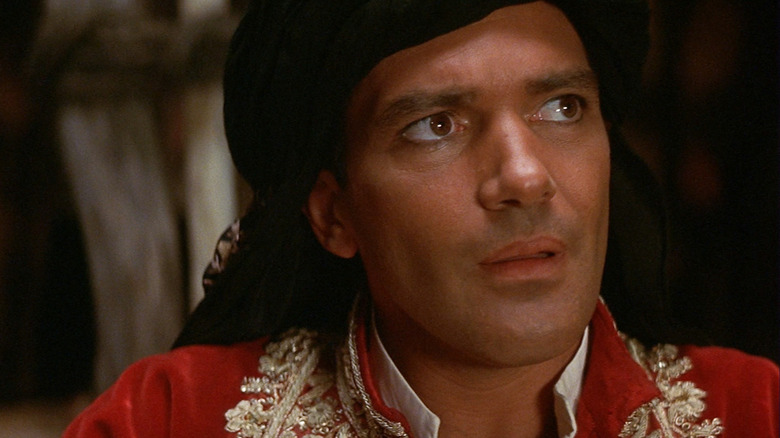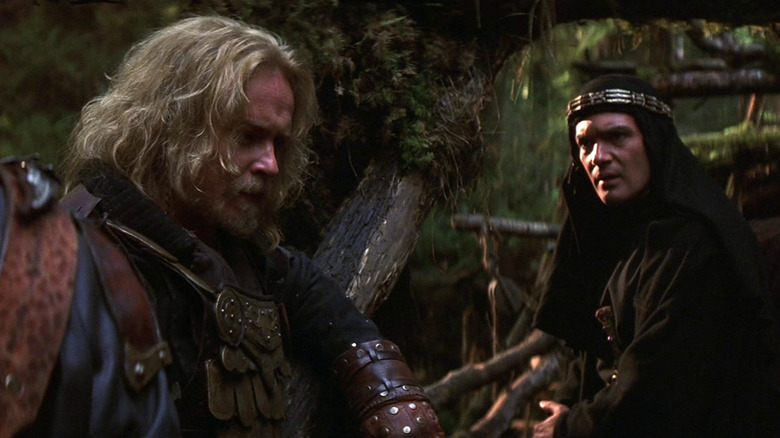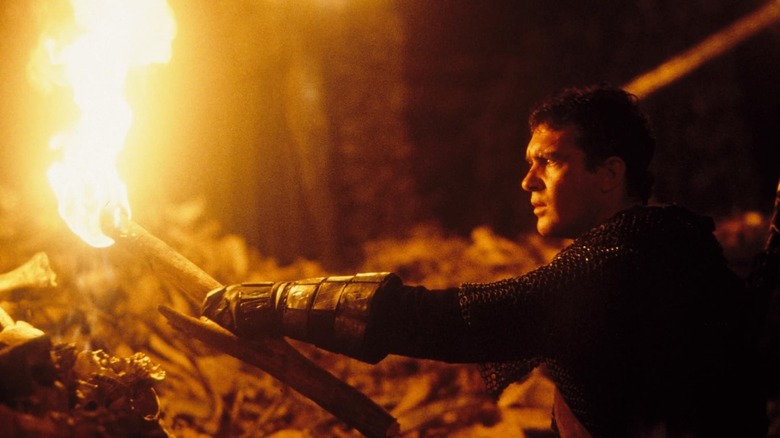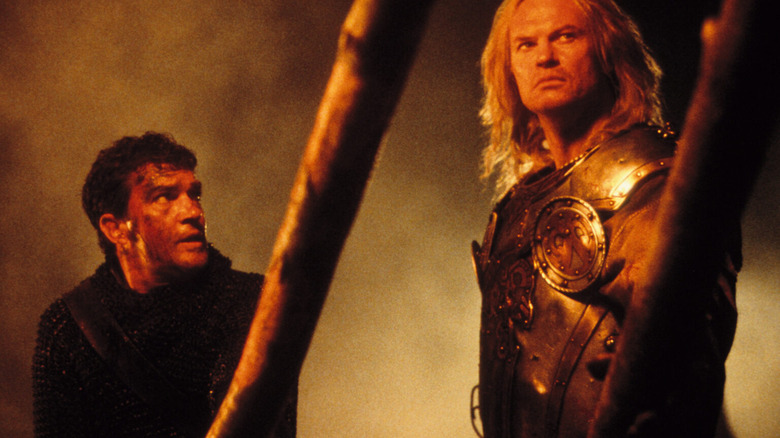The Antonio Banderas Action Film That Became A Box Office Flop And Lost $98 Million
According to Box Office Mojo, the lowest-grossing opening for a major studio's wide release remains, over a decade later, "The Oogieloves in the Big Balloon Adventure." That film opened in late August 2012 and grossed a mere $443,901 in its first weekend. That averages out to about $200 per screen. As I was one of the attendees, I pushed the grosses up from a mere $443,889.
Studying box office bombs is always fascinating, as there doesn't seem to be much rhyme nor reason over which films succeed and which films tank. Studios typically pour money into movies they consider "safe bets," usually making sequels and costly, proven franchise movies as their tentpoles, and many such films are indeed expected to succeed. It was unlikely that "Avengers: Endgame" would tank after the success of the previous 18 Marvel Cinematic Universe films.
Other films, however, seem perfectly poised to be hits and tank regardless. Some may have excellent special effects, great stories, proven stars, or even recognizable I.P., and yet no one will be interested. It will take a little bit of picking apart to find out why something like "Valerian and the City of a Thousand Planets" or "John Carter" bombed as hard as they did. The latter, incidentally, remains the biggest box office bomb of all time.
John McTiernan's 1999 historical battle picture "The 13th Warrior" is one of those mysteries. It starred the hot Antonio Banderas and celebrated international actor Omar Sharif. It had outsize production value and was made not long after "Braveheart," a time when historical battle epics appeared to be briefly in vogue. It was also based on a novel by Michael Crichton, whose book "Jurassic Park" was adapted into a film of some renown.
So what happened?
Firstly, it was expensive AF
The original title of "The 13th Warrior" was to be "Eaters of the Dead," which is also the title of Michael Crichton's source material. That was only one of many changes that happened over the course of its development. The budget was already high at $85 million when major reshoots and re-edits had to take place. Evidently, John McTiernan's original cut tested incredibly badly with audiences, as it was seemingly too long and contained way too many subplots. The film was evidently so bad that the studio needed to rework it dramatically. Michael Crichton himself was brought in to direct new scenes and edit out old subplots. It should be noted that Crichton was an experienced director who had already made films like "Westworld," "Coma," "Looker," and "Runaway."
The author was not credited for his work on "The 13th Warrior," but he did make multiple sweeping changes that caused the film's budget to balloon from $85 to over $100 million. Crichton also removed the score that had already been composed by Graeme Revell and hired Jerry Goldsmith to write all-new music. "The 13th Warrior" began its production in the summer of 1997 and it would not reach theaters until almost two years later. The delays and reshoots and additional advertising led to the final cumulative budget coming in around $160 million. That's around $292 million in 2023 dollars. For the sake of comparison, "Indiana Jones and the Dial of Destiny" cost a reported $300 million. "No Time to Die" only cost $250 million.
High costs, delays, and troubled productions don't necessarily equate to a disastrous film — some movies have been salvaged from similar situations before — but it's rarely a good sign of success.
The reviews
Perhaps the most glaring detail of "The 13th Warrior" is how boring it is. Despite elaborate costumes and production design, the story simply isn't that interesting. Based loosely on the real life of Ahmad ibn Fadlan, a 10th-century Iraqi traveler, "The 13th Warrior" follows our hero (Antonio Banderas) far away from his home and into the company of a tribe of crass, violent Norsemen. One of the Norsemen is named Buliwyf (Vladimir Kulich), a.k.a. Beowulf. Yes, the pair will brush up against other figures from the famed early English poem. Together, Ahmad and the Norsemen will have to face off against a marauding clan called Wendol, a.k.a. Grendel. The Wendol are cannibals who eat the people they slaughter in battle. By the end of the film, many people will have died by the sword.
While there may be a certain literary and historic thrill to seeing references to "Beowulf" and to the travels of Ahmad ibn Fadlan, it wasn't enough to bring in a mass crowd. It didn't help that the film was dreary and badly paced. The film takes forever to get going, as Ahmad's early travels with the Viking fratboys drag on for a sizable portion of the film's running time. Any chances to display a meeting of cultures are replaced by dull-as-toast sword-fighing mayhem.
Critics were not kind either. Roger Ebert gave the film a mere star-and-a-half. "[I]t displays a lot of cash on the screen," Ebert wrote, "but little thought." Even the positive reviews were blunt, with the Village Voice calling "The 13th Warrior" an efficient slab of meat. It came and went in 1999, swallowed up by its main competition: M. Night Shyamalan's unexpected mega-hit "The Sixth Sense."
The film has a 33% approval rating on Rotten Tomatoes.
The final word
According to Box Office Mojo, "The 13th Warrior" opened to a mere $10 million, a drop in the bucket for its massive budget. Domestically, it only earned about $32 million, and, adding international receipts, topped out at just under $62 million. The website How Stuff Works calculated the combined losses on "The 13th Warrior" to be $98 million. In 2023 dollars, that's about $178 million in losses.
The film was such a miserable experience for Omar Sharif that, in a contemporary interview, he said he gave up acting for a few years:
"After my small role in 'The 13th Warrior' with Antonio Banderas, I said to myself 'Let us stop this nonsense, these meal tickets that we do because it pays well. Unless I find a stupendous film that I love. And that makes me want to leave home to do, I will stop.' Bad pictures are very humiliating, I was really sick. It is terrifying to have to do the dialogue from bad scripts, to face a director who does not know what he is doing, in a film so bad that it is not even worth exploring."
As films get more expensive, the bombs only get bigger. One might find (through compilation websites and the like) that 13 of the 20 biggest bombs of all time have been made since 2010. 2022 alone saw major losses from "Black Adam," "Strange World," "Lightyear," "Amsterdam," "The 355," and "Moonfall."
The movie industry appears to be in flux right now. The high-risk-high-return movies are becoming less common, with previous surefire films — Pixar, the MCU, Star Wars — turning out too-frequent duds. We like to think "The 13th Warrior" could never happen again, but it seems it happens all the time.



